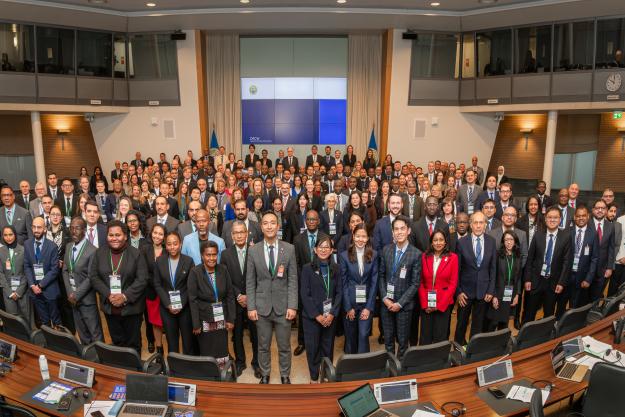
Representatives from National Authorities gathered for the annual meeting at OPCW Headquarters in The Hague, the Netherlands, from 19 – 21 November 2025.
THE HAGUE, Netherlands—21 November 2025—The Organisation for the Prohibition of Chemical Weapons (OPCW) held the Twenty-Seventh Annual Meeting of National Authorities from 19-21 November at its Headquarters in The Hague. More than 230 participants from OPCW Member States gathered to strengthen national implementation of the Chemical Weapons Convention (CWC) and enhance cooperation in addressing chemical safety and security challenges.
Opening the meeting, OPCW Director-General, Ambassador Fernando Arias, highlighted the value of bringing National Authorities together, stating: “In today’s degrading international environment where global security is marked by mounting pressure and geopolitical tensions, the OPCW’s mission is now more relevant than ever. The National Authorities Meeting fosters collaboration and dialogue and reinforces the foundation for achieving our shared objective: a world forever free of chemical weapons.”
The annual meeting serves as a dynamic platform for communication and collaboration between National Authorities and the OPCW Technical Secretariat. It promotes cooperation at national and regional levels, strengthens partnerships, and provides an opportunity to align capacity-building initiatives with the needs of Member States.
Enhancing legislative frameworks and accountability
This year’s meeting focused on enhancing national implementation frameworks, with emphasis on legislative and enforcement measures under Article VII of the Convention. Sessions explored how States Parties can develop robust legal mechanisms to fulfil their CWC obligations and close implementation gaps.
The meeting also examined accountability mechanisms and penal provisions necessary to prevent and address CWC-prohibited activities. “From the perspective of investigation, prosecution, and adjudication, accountability mechanisms are essential to enforcing the Chemical Weapons Convention,” said Talgat Toleubayev, Regional Coordinator for Southeast and Eastern Europe at UNICRI. “They support the systematic collection of reliable evidence, safeguard due process, and enable the fair and transparent resolution of alleged violations.”
National Authorities also shared experiences on effective enforcement strategies and discussed approaches to ensure compliance with the Convention at national and regional levels.
Addressing emerging technologies and chemical security
The impact of emerging technologies on chemical safety, security, and non-proliferation was a key point of discussion. Participants explored how artificial intelligence and other technological advances present both opportunities and challenges for implementing the Convention.
“Artificial intelligence could positively impact the implementation of legislation by reducing administrative tasks,” said Manish Jhinkoe-Rai, Policy Officer Export Control and Strategic Goods at the National Authority of the Netherlands. “At the same, we have to be aware of future challenges which include that AI could be used to bypass the verification mechanism of the CWC.”
Participants also addressed strategies for building national capacities to prevent the illicit transfer of toxic chemicals, while leveraging technology to enhance verification and assistance activities.
Strengthening regional networks and international partnerships
Building on outcomes from the 2025 Regional Meetings of National Authorities, the meeting provided a forum to strengthen regional coordination and share best practices across geographical areas.
Contributions from key international partners, including EUROPOL, UNICRI, INTERPOL, and the World Customs Organization underscored the importance of coordinated multilateral approaches to chemical weapons non-proliferation.
Background
National Authorities serve as the national focal point for effective liaison with the OPCW and with other States Parties. They are entrusted with coordinating the implementation of the Chemical Weapons Convention at the country level. For that purpose they collaborate with relevant national stakeholders on implementation issues.
As the implementing body for the Chemical Weapons Convention, the OPCW, with its 193 Member States, oversees the global endeavour to permanently eliminate chemical weapons. Since the Convention’s entry into force in 1997, it is the most successful disarmament treaty eliminating an entire class of weapons of mass destruction.
In 2023, the OPCW verified that all chemical weapons stockpiles declared by the 193 States Parties to the Chemical Weapons Convention since 1997 — totalling 72,304 metric tonnes of chemical agents — have been irreversibly destroyed under the OPCW’s strict verification regime.
For its extensive efforts in eliminating chemical weapons, the OPCW received the 2013 Nobel Peace Prize.
